GOAL’s activities involve meetings, workshops, and seminars that promote exchange between specialists, transfer of knowledge as well as co-operations. Upcoming events are found on our Events page. Some of our past activities have involved:
- GOAL 2023 – Geosciences in the 21st century: digitalization, sustainability and strategic metals, San José, Costa Rica
- GOAL 2022 – Geosciences in the 21st century: digitalization, sustainability and strategic metals, Greifswald and Freiberg, Germany
- GOAL 2002-2022 Geo Network o f Latinamerican German Alumni ( GOAL ) – TWENTY YEARS AND AHEAD
- The role of Geociences to societal development: a German – Latin american perspective (Monterrey, México) 2017
- Sustainable Development of Geo-Resources — Achievements and challenges (Bogotá, Colombia) 2016
- Geosciences and Society — Bridging the gap with GeoParks and Co (Heidelberg, Germany) 2014
- Geo-risk Management — A German-Latin American Perspective (Heidelberg, Germany) 2011
- Sustainable Mining and Environment (Belo Horizonte, Brazil) 2010
- Sustainable Mining and 21st LAK (Freiberg, Germany) 2009
- Geothermal energy and associated volcanism (San José, Costa Rica) 2008
- Spring School (Berlin and Kiel) 2007
- Vulcanology Workshop (Quito, Ecuador) 2006
- VDMA-EXPOMIN-GOAL Meeting (Santiago, Chile) 2004
- Coordinators Meeting and LAK18 (Freiberg, Germany) 2003
- GREMIO Meeting (Lima, Peru) 2002
2023. GOAL 2023- Geosciences in the 21st century: digitalization, sustainability and strategic metals, San José, Costa Rica
From March 16-22, 2023, 34 members from 13 countries met in Costa Rica (Fig. 1). It was the second part of the GOAL (Geo-Network of Latin American-German Alumni) alumni network meeting, which always alternates between Germany and Latin America. The GOAL network is funded by the German Academic Exchange Service as part of the “Alumni Program for the Training and Retention of International Alumni from Developing and Industrialized Countries (2022-2023).” The theme of the current funding period is “Geosciences in the 21st Century: digitalization, sustainability and strategic resources.” As usual, lectures were given on the first day covering a wide range of geosciences at a high academic level. …
See more in the editorial note of the newsletter – NewsletterGOAL_June2023.pdf
Inserir Slides photos
2022. GOAL 2022 – Geosciences in the 21st century: digitalization, sustainability and strategic metals, Greiswald and Freiberg, Germany
The meeting of the alumni network GOAL (Geo-Network of Latin American-German Alumni) took place from October 10th to 15th in Greifswald and Freiberg. This network is funded by the German Academic Exchange Service as part of the “Alumni program for further training and retention of international alumni from developing countries and industrialized countries (2022-2023)”. The topic of the current funding period is “Geosciences in the 21st Century: digitalization, sustainability and strategic resources”. The first part of the meeting took
place at the University of Greifswald and the second in Freiberg…
See more in the editorial note of the newsletter – NewsletterGOAL_December2022.pdf
Octubre 2022 en Alemania (Greifswald-Freiberg) – See the excursion guide: Reporte de excursiòn: DIGITALIZATION, SUSTAINABILITY AND STRATEGIC METALS (Greifswald-Freiberg, October 2022)
2022. GOAL 2002 – 2022 – Geo Network o f Latinamerican German Alumni (GOAL)
TWENTY YEARS AND AHEAD
In this section, you can consult the memories of our network over the last twenty years written by our Regional Coordinator Reinaldo García.
2017. The role of Geosciences to societal development: a German-Latin American perspective (Monterrey, México) 2017
SUMMARY
The GOAL 2017 Workshop “THE ROLE OF GEOSCIENCES TO SOCIAL DEVELOPMENT: A GERMAN – LATIN AMERICAN PERSPECTIVE” was held in Mexico from 8 to 15 May. The headquarters was the Universidad Autónoma de Nuevo León, in Civil Engineering School (Monterrey) and the Earth Sciences School (Linares).
The workshop consisted of a series of conferences, internal meetings, and fieldwork in the states of Nuevo Leon, Coahuila, and San Luis Potosí, celebrating the 15th Anniversary of GOAL. We received the support of the company Industrial Mining Solutions (http://www.inmso.com/) and the Mexican Geological Survey (https://www.gob.mx/sgm).
The conferences were presented at the Auditorium Ing. Manuel Martínez Carranza of the Civil Engineering School of UANL. There were 29 lectures of Goalistas, 6 of invited Researchers, and 2 special guests. The themes of the talks were: a) Georesources and Society, b) Geosciences and Environment, c) Sustainable Development of Water Resources, d) Georisks and Mitigation, e) Seismicity and its Urban Impact, and f) Geology and Climatology.
During the field activities, the following topics were developed.
A) Visita to the plant Ramos Arizpe, Coahuila, of the company Lafarge-Holcim. After seeing an institutional video, Ing. Juan Raúl Martínez Martínez led us to the control center, where the process of cement production was explained. Later we took a tour of the company’s facilities.
B) Huasteca Canyon. In this interesting locality of the Curvature of Monterrey, we were led by Dr. Uwe Jenchen (Earth Sciences School – UANL) explaining the geology and stratigraphy of the region. We observed in particular calcareous Cretaceous rocks. We also visited a water well, for distribution to Monterrey. Later, a tour was made to the Rompepicos Dam, built to control extraordinary avenues that could affect the metropolitan area of Monterrey, especially during hurricanes.
C) Transect Santa Rosa Canyon, Linares – Galeana. It was possible to observe the Mesozoic sequence of the Sierra Madre Oriental and the problems related to slope stability. In addition, the base of the transgression sequence was recognized in the Triassic red beds.
D) Pozo del Gavilán and Laguna de Labradores. Magnificent examples of karst structures developed in sulphatic Jurassic rocks and related soils, and their associated risks.
E) Underground fires, Catarino Rodríguez. Quaternary peat deposits in natural ignition, and associated risks.
F) Visit to the Santa Maria de la Paz mine in Matehuala, San Luis Potosí. Ing. José Manuel González Ochoa explained that the ore deposit is a skarn type, with economic copper mineralization. One part of the group had the opportunity to visit the exploitation front in the underground mine. G) Visit Real de Catorce, S.L.P., a historic mining town, now Pueblo Mágico. The geology of the Sierra de Catorce was exposed, as well as the customs of the Huichol people. They develop important and ancient ceremonial activities in this area.H) Visit to the historical center of the city of San Luis Potosí, guided by Dr. Rubén López Doncel (Institute of Geology, UASLP). The tour showed the effects of the deterioration in the volcanic rocks, which are the raw material of the historic buildings of this colonial city, a UNESCO World Heritage Site. In addition, it was possible to verify the effect of the neotectonics, in fractures and faults of the same buildings.
During the internal work meetings, the plans for the GOAL workshops in Freiberg 2018 and Paraguay 2019 were discussed, among other things. Updates to the web page were also presented (https://geonetwork-goal.org/en/ home). On the other hand, the collaboration between the goalkeepers in the areas of hydrogeology, environmental pollution, petrology and geodynamics, and preservation of historical buildings, among others, is highly encouraged. It was openly proposed to invite the colleagues Dr. Rubén López Doncel and Dr. Uwe Jenchen to join the GOAL network.
This document does not represent the minutes of the agreements taken in the meetings of the Goalistas.
Alonso Ramírez, 24 de may 2017
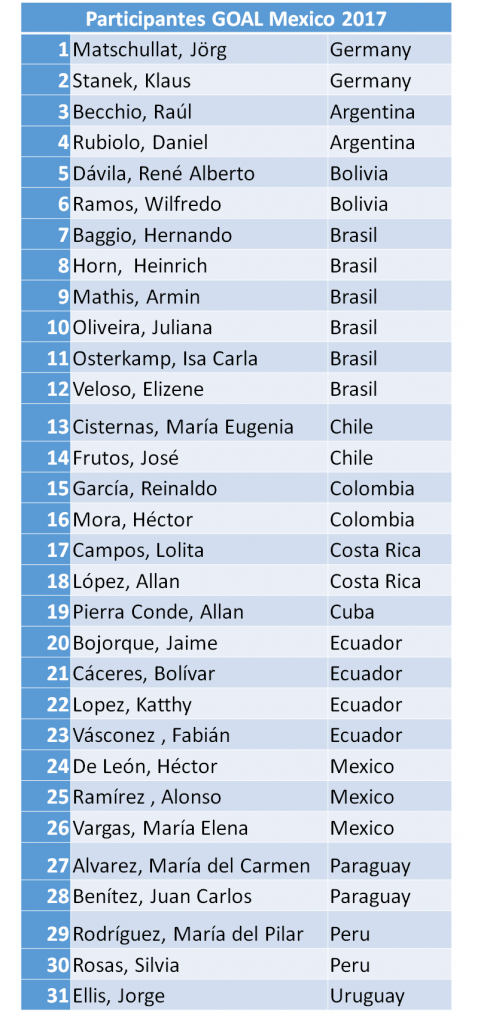
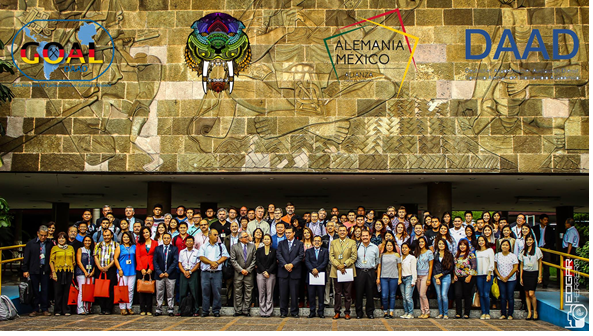
Photo in front of the facade of the Civil Engineering School, the day of the inauguration of the Goal Workshop. May 8, 2017.
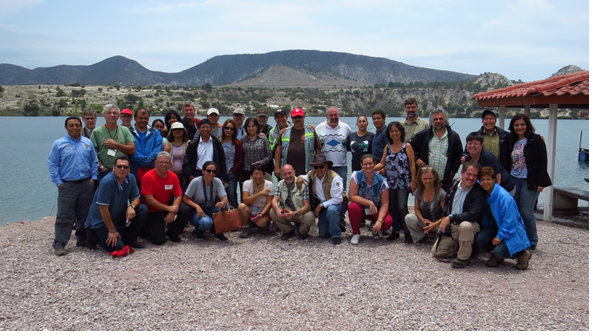
Goalistas in Laguna de Labradores, Galeana, N.L. May 12, 2017.
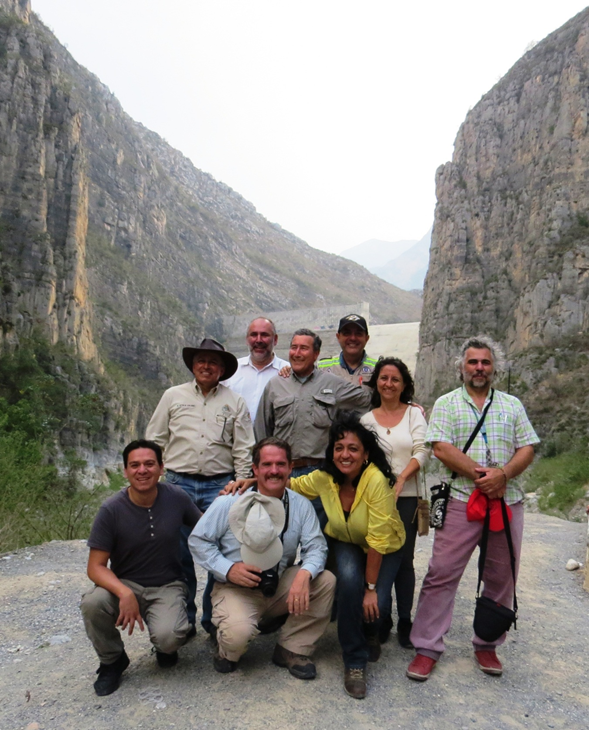
Goal founders. Presa Rompepicos, Santa Catarina, N.L. Top left To the left: Héctor de León, Jorge Ellis, Reinaldo García, Alonso Ramírez, Juliana Oliveira, Raúl Becchio. Bottom: Jaime Bojorque, Fabián Vasconez, Silvia Rosas. May 10, 2017.
2016. Sustainable Development of Geo-Resources — Achievements and challenges (Bogotá, Colombia) 2016
As part of the celebration of the 100th anniversary of the Colombian Geological Survey, the GOAL Workshop 2016 “Sustainable Development of Georesources: Achievements & Challenges” was held in Bogotá, Colombia, from September 26 to 30, 2016. The event was organized jointly with the Colombian Geological Survey and with the support of the National University of Colombia and the Colombian Geological Society. Thirty DAAD alumni from 11 Latin American countries (Argentina, Bolivia, Brazil, Chile, Costa Rica, Cuba, Ecuador, México, Paraguay, Perú and Uruguay) and three from Germany attended the workshop to share their experiences from research projects carried out in each country.
The meeting involved two segments: the academic/scientific sessions and the field trip. In the initial part there were 38 talks presented at the scientific sessions that were also attended by students from different universities with geoscience programs. This allowed GOAL to show how it effectively works as an international platform for the dissemination of knowledge. The sessions included talks that were given by the DAAD Representative in Colombia and by a professor at the Goethe Institute in Colombia, which highlighted the promotion of learning the German language. A field trip was made to the Villa de Leyva area, located in the Boyacá-Province, about 4 hours from Bogotá. Due to its unique geological characteristics and history, this area is an interesting place for geologists and geology students. The workshop concluded with an internal meeting of the GOAL members in order to share ideas about how to promote and strengthen the network.
2014. Geosciences and Society — Bridging the gap with GeoParks and Co (Heidelberg, Germany) 2014
The GOAL Workshop 2014 was held in conjunction with the 23rd Latin American Colloquium on Earth Sciences (LAK 2014) at the Institute of Earth Sciences, Rupprecht-Karls-University Heidelberg. The Workshop included about 40 presentations with intensive discussions, short excursions to the old copper mine in Schriesheim, and longer excursions to the geoparks in Odenwald, Schwäbische Alb, and the impact crater Nördlinger Ries with the Ries Museum. The final highlight was the visit to the UNESCO World Heritage site, Grube Messel.
Over the last few years, several times Latin American countries applied in vain for a geo-park (UNESCO-based category). Of the total of currently 100 successful geopark projects worldwide, there are only two in Latin America (one each in Brazil and Uruguay). For this reason, the workshop and excursion aimed to build knowledge and exchange experience on Geoparks. The excursion to visit successful German geopark projects near the event location enabled participants to directly talk to and discuss with responsible colleagues on site. This approach could fully be realized and must certainly be seen as highly successful. It was important and very good for the GOAL network to see that the long-term Regional GOAL coordinator for Latin America, Prof. Reinaldo Garcia (Columbia and Canada) was willing to shoulder this task for another period and was re-elected univocally.
2011. Geo-risk Management — A German–Latin American Perspective (Heidelberg, Germany)
2011 As proposed at the last workshop held in Germany (Freiberg, 2009), this event in Heidelberg was oriented towards geo-hazard management. With the participation of 26 GOAL members from 14 countries, the workshop focused on earthquakes, landslides and associated inundations, suberosion, volcanic eruptions, and lahars, regional perspectives on climatic change, extreme weather conditions, and water contamination. GOAL members were actively involved in the 22nd Latin American Colloquium on Earth Sciences (LAK 2011), which also took place at the University of Heidelberg.
Two interesting field excursions were carried out to complement the oral presentations: one in the Upper Rhine Valley that centered on rock slides and neotectonics, and the second one in the East Eifel volcanic field and the Cologne Lowland that focussed on volcanic hazards and paleoseismicity.
The internal meeting raised issues about the future of the Network in terms of its growth and strength, as well as the topics on which the following meetings would focus. Workshop themes on geoparks, geotourism, and geological-mining heritage were proposed.
2010. Sustainable Mining and Environment (Belo Horizonte, Brazil) 2010
Twenty-eight DAAD alumni from 13 Latin-American countries, four from Germany, plus 48 additional Brazilian participants followed the invitation to further improve and collaborate in their quest to develop sustainable mining. The continent, being one of the key areas worldwide for mineral resource exploration and exploitation, has a major interest in avoiding future trouble by environmental pollution while maintaining economic well-being and social stability.
Prior to the workshop, the GOAL organizers invited interested participants to two 2-day short courses on “Geochemical mapping for sustainability” (Jörg Matschullat, TU Bergakademie Freiberg, Germany), and “Vulcanic and seismic hazards” (Guillermo Alvarado Induni, University of Costa Rica, San Jose). Both courses were evaluated very positively by the participants, who were mostly advanced students and professionals from various companies and institutions.
The event ended in a memorable excursion to various mining sites and the geological settings of Minas Gerais state, touching on technical and environmental issues with quite some detail. The event ended with the internal GOAL members’ meeting.
2009. Sustainable Mining and 21st LAK (Freiberg, Germany) 2009
This two-part event involved the workshop based at the Technical University of Freiberg and the 21st Latin American Colloquium on Earth Sciences (LAK 2009) at the University of Göttingen. The workshop began with interesting talks by German experts, related to the geology and environmental aspects of mining in Germany, and continued with presentations by 23 GOAL member participants on topics related to sustainable mining, providing several examples from Latin American countries. The talks were complemented by field trips to uranium mining sites near Ronnenburg, a lignite open-pit mining and recultivation site near Leipzig, as well as to locations representing ancient mining, smelting, and environmental aspects in the region southeast of the Harz Mountains.
During the GOAL internal meeting, held at the Geoscience Center in Göttingen, aspects of the Geo-Network’s consolidation were discussed, in addition to defining both the country and the theme of the following seminar in 2010. Brazil was chosen to develop the second segment of “Sustainable Mining and Environment — a German–Latin American perspective”, taking into account its experience in this matter. For the subsequent workshop to be carried out in Germany, the general theme was outlined to focus on risk management, which would fit into the subject proposed by the 22nd Latin American Colloquium on Earth Sciences (LAK 2011).
2008. Geothermal energy and associated volcanism (San José, Costa Rica, 2008)
This workshop in Costa Rica was the thematic continuation of the previous year’s workshop on Geothermal Technologies and Hydrothermal Systems, which had been held in Berlin-Schwanenwerder-Kiel (Germany). Both events are of special significance because experiences on the use of geothermal techniques on two continents could be shared, providing a valuable exchange of geoscientific knowledge between the GOAL Network members.
The Costa Rican workshop was framed within the celebration of the International Year of Planet Earth with its central message “Geology, human development in harmony with the Planet”. The GOAL workshop followed the IX Central American Geological Congress and VI National Geological Congress.
Thirty members of GOAL participated in the program developed in San José and Guanacaste that focused on geothermal energy as an alternative, viable, and environmentally friendly technology. Around this main theme, other issues were studied such as geothermal exploration techniques and geochemically aggressive solutions once the field is in full production. Collateral to these main subjects, presentations dealt with hydrothermal alteration and residual volcanic activity, geotourism in volcanic environments, and the criteria for recognizing explosive and effusive volcanic sequences.
In addition to theoretical aspects, the workshop was complemented by significant fieldwork. Volcanic outcrops and two geothermal fields were visited—one in production at the Miravalles Volcano and one in exploration in the areas of Borinquen, Las Pailas, and Nuevo Mundo.
At the internal GOAL meeting, the next workshop was proposed for 2009 under the theme “Sustainable mining and environmental impact”, to be held in Göttingen, Germany.
2007. Spring School (Berlin and Kiel) 2007
This “Spring School” encompassed two parts: a course on “Geothermal Technologies and Hydrothermal Systems” and the 20th Colloquium on Latin-American Earth Sciences (LAK20). The event took place in the Evangelische Bildungsstätte, Berlin, from April 2–10, the first part of GOAL´s Spring School. With the expertise of distinguished German professionals at the TU Bergakademie Freiberg, the GFZ German Research Centre for Geosciences, the BGR German Geological Survey (Bundesanstalt für Geowissenschaften und Rohstoffe) and the DAAD, important themes were developed in the course that dealt with: Geothermal exploration and reservoir characterization and engineering, Drilling, Exploration methods, Utilization of technologies, Projects in Central and South America, Change detection for hydrothermal features (case study: Yellowstone National Park, USA), Sampling of submarine geothermal features (case study: Panarea, Aeolian islands, Italy), and The role of alumni networks, their status and perspectives.
A special session was devoted to a presentation by Latin American GOAL participants, in which the contributions focused on the temperature of potential geothermal fields, porosity, and permeability of geothermal fields. The course involved fieldwork at two geothermal plants, visits to the Reichstag (history and energy technology) and to the Ethnological Museum of Berlin-Dahlem (Hispanic Section), and an excursion to the western Mecklenburg-Vorpommern region. An internal GOAL meeting was held to analyze its present status, achievements, and future activities.
2006. Vulcanology Workshop (Quito, Ecuador) 2006
 As part of the program of the international event “Cities on Volcanoes“, GOAL organized and carried out the outstanding workshop “Recognition of Volcanic Sequences“ in Quito from January 30 to February 3 with 38 participants, mostly GOAL members.
As part of the program of the international event “Cities on Volcanoes“, GOAL organized and carried out the outstanding workshop “Recognition of Volcanic Sequences“ in Quito from January 30 to February 3 with 38 participants, mostly GOAL members.
An international training course on “Volcanology of the Central Andes” has been held for several years at the University of Salta, Argentina. This time, the course was held in Ecuador jointly by specialists from the Geophysical Institute of the Escuela Politécnica Nacional, Ecuador, the Centre of Volcanic Textures of the Geological Institute of the Technical University Bergakademie Freiberg, Germany, and the National University of Salta, Argentina, who contributed with their knowledge about the volcanology of the different volcanic zones of the Andes.
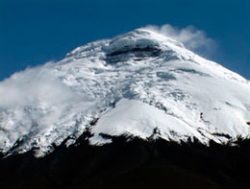 One of the main goals of the workshop was the recognition of volcanic textures in outcrop and thin sections and the interpretation of volcanic sequences as one of the most substantial conditions for volcanic risk assessment. The workshop was structured in classes dedicated to theoretical aspects and labs, including microscopy. The importance of field evidence was emphasized through an interesting field trip to the Cotopaxi volcano area. In addition to funds provided by the DAAD, the workshop received generous financial support from the Earth Science Division of UNESCO.
One of the main goals of the workshop was the recognition of volcanic textures in outcrop and thin sections and the interpretation of volcanic sequences as one of the most substantial conditions for volcanic risk assessment. The workshop was structured in classes dedicated to theoretical aspects and labs, including microscopy. The importance of field evidence was emphasized through an interesting field trip to the Cotopaxi volcano area. In addition to funds provided by the DAAD, the workshop received generous financial support from the Earth Science Division of UNESCO.
2004. VDMA-EXPOMIN-GOAL Meeting (Santiago, Chile) 2004
A joint symposium with the German Federation of Engineering Industries (Verband Deutscher Maschinen und Anlagenbauer-VDMA) and GOAL took place within the framework of an exhibition for the small-scale mining industry “EXPOMIN” (Exposición para pequeña minería), in Santiago de Chile on April 22, 2004. The symposium’s central theme, “Development of the mining market in Latin America”, allowed GOAL participant members to analyze the role of our network in the industry in general and in the mining industry in particular. Two important topics were discussed: the future of mining in South America and the contributions of mining activity to the sustainable development of mineral-rich countries in Latin America.
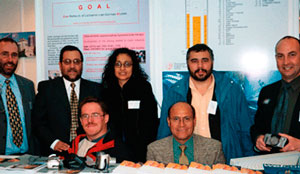 During the Santiago meeting, members were informed about the future international GOAL event “Cities on Volcanoes” to be held in late January 2006 in Quito, Ecuador.
During the Santiago meeting, members were informed about the future international GOAL event “Cities on Volcanoes” to be held in late January 2006 in Quito, Ecuador.
2003. Coordinators Meeting and LAK18 (Freiberg, Germany) 2003
On April 2, 2003, the GOAL National Coordinators met the German GOAL representatives at the Geological Institute of TU Bergakademie Freiberg in Saxony, Germany. The meeting preceded the scientific program of the 18th Latin American Colloquium of Geosciences (LAK18) in Freiberg. During the one-day GOAL meeting, the main topics discussed included an updated report on the status of GOAL, past and future activities, the set-up of a member database in cooperation with DAAD, the organization of courses of continued professional education, the presentation of GOAL in scientific meetings and industry fairs and its cooperation with the mining industry.
2002. GREMIO Meeting (Lima, Peru) 2002
This meeting was held in Lima on July 5–7, 2002, under the theme “Geo-Resources and Environment” (Georecursos y medio ambiente-GREMIO). It took place in the facilities of the Department of Mining Engineering and Geology at Pontificia Universidad Católica del Perú (PUCP) and was attended by over 30 Latin American alumni and 7 German participants. Much support and expertise came from representatives of the Sección de Ingenería de Minas of PUCP. This meeting was meaningful not only for the professional GREMIO event itself but also because it launched the new network GOAL.







